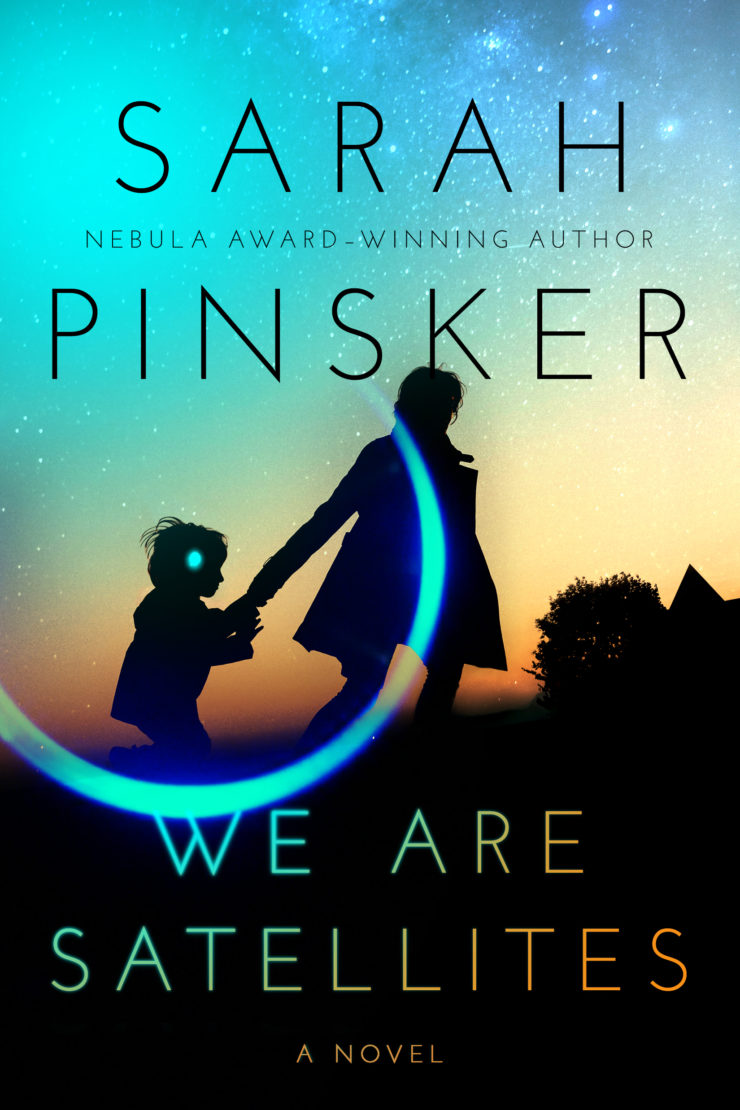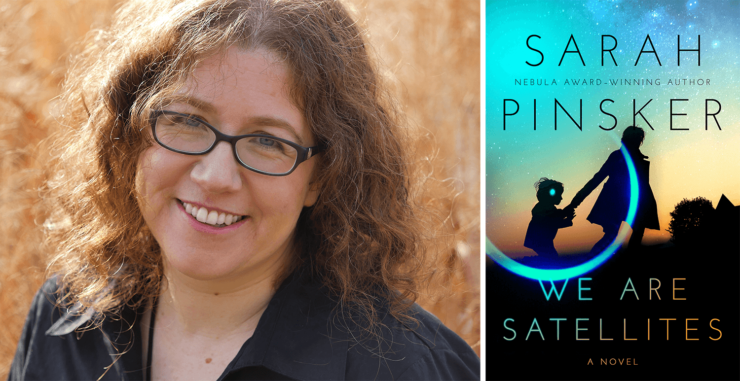Tor.com is thrilled to share the cover and an exclusive excerpt from We Are Satellites, the new novel from Nebula Award winning writer Sarah Pinsker! The novel, which takes place in a near-future where virtual assistants are implanted directly into the brain, will be available from Berkley on May 11, 2021. Start reading below!
Val and Julie just want what’s best for their kids, David and Sophie. So when teenage son David comes home one day asking for a Pilot, a new brain implant to help with school, they reluctantly agree. This is the future, after all.
Soon, Julie feels mounting pressure at work to get a Pilot to keep pace with her colleagues, leaving Val and Sophie part of the shrinking minority of people without the device.
Before long, the implications are clear, for the family and society: get a Pilot or get left behind. With government subsidies and no downside, why would anyone refuse? And how do you stop a technology once it’s everywhere? Those are the questions Sophie and her anti-Pilot movement rise up to answer, even if it puts them up against the Pilot’s powerful manufacturer and pits Sophie against the people she loves most.
Buy the Book


We Are Satellites

Sarah Pinsker’s Nebula and Sturgeon Award-winning short fiction has appeared in Asimov’s and F&SF, as well as numerous other magazines, anthologies, and translation markets. She is a singer/songwriter who has toured behind three albums on various independent labels. Her first collection, Sooner or Later Everything Falls Into the Sea, was released in early 2019 by Small Beer Press. A Song for a New Day is her first novel. She lives with her wife in Baltimore, Maryland.
CHAPTER ONE
VAL
There was a blue light in the balcony. Val lingered in the stage wing, looking out on a darkened auditorium and one illicit pin-prick, electric blue. The girls squirmed and tapped their feet and whispered to each other by the glow of the ancient anti-drunk-driving smash-’em-up film. A mournful pop song that had been old long before she herself hit high school gave their boredom a soundtrack.
The school had a strict policy on electronics: no checking phones except between classes, tablets in school mode to allow work and emergency contact, but no social media. She slipped away from the stage. The light probably wasn’t worth chasing, but this assembly always felt interminable, and the hunt gave her something to do.
Around the back and up the stairs and then she was there, scanning the darkness for the steady light she had noticed from below. Only seniors were allowed to sit in the balcony, and most had skipped the assembly. There was supposed to be a teacher up here, but she couldn’t remember who had been assigned; if they were here, maybe they weren’t at the right angle to notice whatever she had seen. She spotted it again, still the same tiny light though now she was closer. It twinned itself as she made her way down the aisle.
“Phones off, girls,” she whispered, though she didn’t see any devices out.
Nobody moved. One student had a binder open on her lap, but Val wasn’t policing that. She settled in a vacant seat, waiting for her eyes to adjust to the dimness. She saw blue again, a flash in the dark as a girl across the aisle regathered her microbraids in a ponytail. Val thought at first it was a ring on a finger, but no, it hadn’t been on the girl’s hand. An LED earring, maybe? She descended to the railing, on the pretext of looking over the edge, then turned. As she looked up again, the fiery car crash on the screen below illuminated the girls in the balcony.
***
And when I turned again, I realized they weren’t earrings. Two girls had lights embedded in their temples! Tell me this isn’t some new fad, please.”
An hour after the assembly, Val recounted the experience to Angela Lin, soccer coach and history teacher, in the cafeteria. Both had brought their own food to lunch duty.
“I can tell you, but I’d be lying.” Angie motioned with her celery stick at a nearby table, where several girls had the tiny blue lights at the edge of their hairlines.
Val groaned. “What is it? Head studs instead of ear studs?” “Some new study gadget, I think.”
“A study fad? Is that an oxymoron?” She was glad to hear they were new; disconcerting to think she’d missed something like this for long.
“Maybe. I only started noticing them a few weeks ago. Haven’t gotten to looking into them beyond what one of my players told me.” Val eyed the students. She couldn’t tell from this distance whether it was adhesive or a piercing or what. She didn’t know anyone in the group, which meant they didn’t run track, and none were freshmen; she taught freshman gym and geography in addition to coaching. As she watched, one girl without the light reached out and touched the light on another’s head; she looked thoughtful.
“Is it something we’re going to get a memo about?” she asked. “I’m pretty sure it’s legal, for now at least, and I’m not sure it’s a bad thing. Attention boosting has to help us, right?”
“I guess so. What if your goalkeeper comes in with one? Or Grover High’s goalkeeper faces off against your girl with one when yours doesn’t have one?”
Angela bit her lip. “Good question.” “Is it pricey?”
“I really don’t know. I’d guess so, given who has them. That’s a corporate lawyer’s daughter and a pro football player’s daughter sitting next to each other. I don’t know the other girls, but they have expensive-looking hair. Next week we’ll probably be seeing fakes or knockoffs or other colors. You know how it goes.”
Val did.
She watched for the lights in her classes after lunch, but didn’t see any on her freshmen. A couple more students with them passed her in the hallway. They didn’t act any different from the other girls. Val wasn’t much for boosters in general. She’d seen a fair number, legal and illegal, and thought they were better left out of the equation. She tried to teach her runners, rich and scholarship alike, that it all came down to their feet and their heads, the physical and the mental.
The same went for the new technologies that appeared in the school, outpacing her own glacial change. Inevitably she came around to one conclusion: people want what they want. She dragged her heels at every step, but never stopped anyone, ever, an anchor without enough weight behind it, slowing the ship without the ability to keep it from running aground. Metaphors weren’t really her thing, but she tried. She tried. Whatever this fad was, she’d deal with it as she had all the previous ones.










